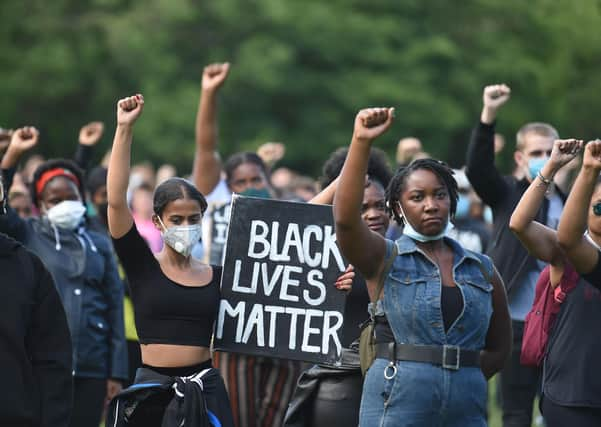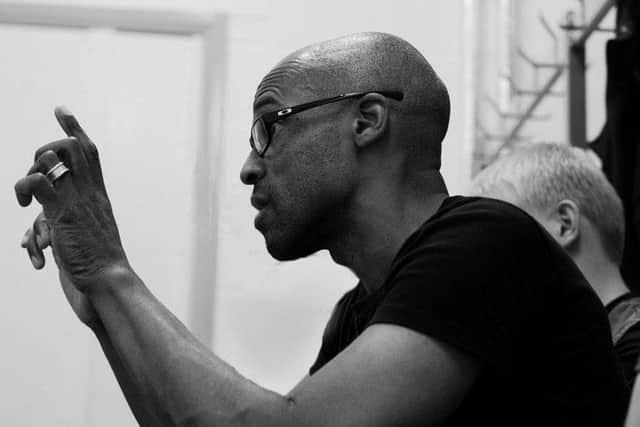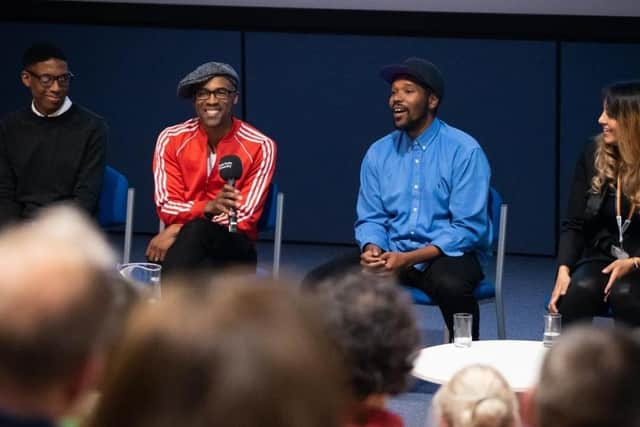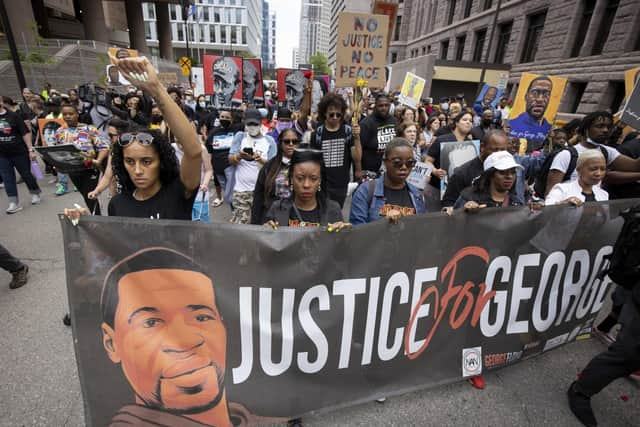Why Leeds Trinity University is hosting a Black Lives Matter event for staff and students to mark anniversary of George Floyd’s murder


Arguments over the nature and extent of racism in British society have rarely been far from the headlines in one form or another since the horrifying killing of George Floyd by police officer Derek Chauvin in the United States a year ago today. But a short film being shown as part of a special event marking the anniversary of Mr Floyd’s death provides a reminder that while the issues may now be receiving greater attention, they are very far from being new.
Leeds Trinity University is hosting a free online event called Black Lives Matter: Accountability, Transparency, Action tomorrow which will provide a platform for black staff, students and alumni to share their experiences. A key part of the event will be a workshop on institutional racism which will focus on an acclaimed short film made by senior film production lecturer Ricardo Barker back in 2019.
Advertisement
Hide AdAdvertisement
Hide AdBarker’s film Re:Tension follows Thapelo, a 19-year-old student, as he wrestles with the idea of whether or not to report racism at his university and the implications that doing so would have.


After an upsetting ‘joke’ gift from members of his football team, the film sees Thapelo deal with a series of events that include a canteen worker putting his change back on the counter rather than handing it to him directly as she has with other student customers, a lecturer criticising him for being late while ignoring a white student doing the same and his coach telling him he is “asking for trouble” if he accuses people of racism.
It was recently shortlisted for Best Educational Film at the Learning on Screen Awards after winning praise for its nuanced exploration of the reality of how racism, micro-aggressions and unconscious bias can function in academic institutions and its refusal to provide viewers with any simple answers.
Barker explains his film was inspired by research done by the university in 2017 which found a much higher drop-out rate among black male students compared to their white counterparts which was followed by seeing national research that painted a similar picture across the country on both that issue and the attainment gap which currently see black students being almost 20 per cent less likely to graduate with a top degree than their white peers.
Advertisement
Hide AdAdvertisement
Hide Ad“I wanted to share the findings with students and colleagues but it was just numbers and figures on an Excel spreadsheet,” he explains. “I thought it would be more compelling if it was dramatised into a narrative. I just thought experiencing it as a drama and from one person’s point of view could be quite powerful.”


Barker, who has previously worked for BBC, ITV and Channel 4, also put his own experiences into the film.
“You had to be a particular way and have a particular mindset and tolerate a certain amount of things that you would come away from and question whether you should have said something or not. I had great colleagues and made lifelong friends but that feeling of being a little bit exposed or being watched or judged and having to be really on your game was always with you.”
He says he does feel things are moving - gradually - in the right direction in the UK. “I think it is really encouraging that the conversation is being had and it is being sustained. These conversations were being had before and engaged with but because it is a very difficult topic and there aren’t any easy answers and it is uncomfortable, the topic would become exhausted and things would never move on. Now it is very much a regular conversation within the media and within institutions. But the rate of change is not fast enough.”
Advertisement
Hide AdAdvertisement
Hide AdHe says at the university the reaction to his film, which he initially only intended to show to close colleagues, has been “absolutely brilliant”.


“Initially after the film there is an uncomfortable silence because some people maybe want an immediate answer. It doesn’t provide that. There is a view in some quarters that the reason that students who come from a particular background or area don’t progress if because they aren’t cut out for university. I don’t think that is true or accurate.”
Barker says while the killing of Floyd happened in America, the facts and footage of his death from Chauvin kneeling on his neck for over nine minutes while other police officers failed to intervene struck a powerful chord across the world.
“It just brought everything to the surface, everything about it was wrong on so many levels. That video captured and distilled everything that people had been campaigning for, arguing for, protesting for.”
Advertisement
Hide AdAdvertisement
Hide AdHe says that having previously watched a “deeply traumatic” video of Eric Garner, who died in 2014 after a police officer put him in a prohibited chokehold, he has been unable bring himself to view the Floyd footage in full.
“I couldn’t bring myself to watch the video. But you couldn’t escape the material and it integrated everything - police brutality and people just stood watching it happen. How it happened was horrific, just the retelling is horrific. We are in the 21st Century and we have all these policies and procedures but still that took place. The subtext is that if it wasn’t videoed, there isn’t much confidence that a court case would have happened. People might say it is just about policing in the US but it is all connected. There is a connection to lived experience and how people can be treated.”
The death of Floyd swiftly prompted Black Lives Matters protests in the US which spread across the world last summer, including to the UK. Initially focused on police brutality, the protests soon led to broader questions being asked in this country about issues like the impact of racism in all areas of society and properly acknowledging the role of the slave trade in British history.
But there has also been a considerable pushback against what critics like Piers Morgan have called a “woke agenda” and “cancel culture”. Last month, the controversial Commission on Race and Ethnic Disparities Report ordered by the Government found Britain is not deliberately rigged against ethnic minorities, denied the widespread existence of institutional racism and condemned “increasingly strident form of anti-racism thinking that seeks to explain all minority disadvantage through the prism of white discrimination”.
Advertisement
Hide AdAdvertisement
Hide AdBarker says the furore around the report highlights how difficult it can be to raise concerns about racism within institutions.
“It is a crazy thing when you think about it. Not only do you have to ensure the initial discrimination and injustice, then you have to endure being told your complaint doesn’t have any grounding. The ‘woke’ criticism personally I think is ridiculous. You are meant to be progressive and evolving in life and anything that can make you and your society and community better is surely the goal. There is always more to learn and things that can be improved. That is exercising self-reflection and an awareness of things not working in society. But with change, you are going to get resistance.
He adds: “I would go as far as saying all institutions should commit to an ongoing process of equality, inclusion and diversity. But you don’t just get it by doing training courses and getting a certificate. It is an ongoing thing of reflection reformation. That is how we make that change. It is about empathy.”
Toolkit on offer to other academic institutions
Ricardo Barker and his colleague Syra Shakir have created a workshop and tool kit for use in all academic institutions to accompany his film.
Advertisement
Hide AdAdvertisement
Hide AdThe Leeds Trinity event tomorrow will also include an interview with Vice-Chancellor Professor Charles Egbu on race inequality and a poem recital by student Macy Iwediebo.
She says: “This event is providing the opportunity for black students such as myself to share their voice. I want to provide a voice for those students, and I am looking forward to sharing how I feel in the current climate of Black Lives Matter and also hearing what others have to say.”
Leeds Trinity received the Race Equality Charter Bronze award last year in recognition of its commitment to improving the representation, progression and success of Black, Asian and Minority Ethnic students and staff.
As part of its ongoing action plan, the University’s focus over the next three years will be on eliminating the attainment gap for Black, Asian and Minority Ethnic students, increasing the number of Black, Asian and Minority Ethnic academic staff and supporting their progression, especially to senior roles.
Advertisement
Hide AdAdvertisement
Hide AdProfessor Egbu says: “At Leeds Trinity University, we have taken positive steps forward towards race equality in higher education, but acknowledge the progress we still need to make. Following our achievement of the Race Equality Charter Bronze award last year, we are committed to holding ourselves accountable and continuing the conversation internally and across the sector in order to drive real change.
“I’m looking forward to sharing my thoughts on race inequality at this event, but more importantly hearing from Black students, alumni and colleagues about their lived experiences.” For more information about tomorrow’s event, visit the Leeds Trinity website. For more information about the workshop and toolkit, email [email protected].
Support The Yorkshire Post and become a subscriber today. Your subscription will help us to continue to bring quality news to the people of Yorkshire. In return, you’ll see fewer ads on site, get free access to our app and receive exclusive members-only offers. Click here to subscribe.
Comment Guidelines
National World encourages reader discussion on our stories. User feedback, insights and back-and-forth exchanges add a rich layer of context to reporting. Please review our Community Guidelines before commenting.